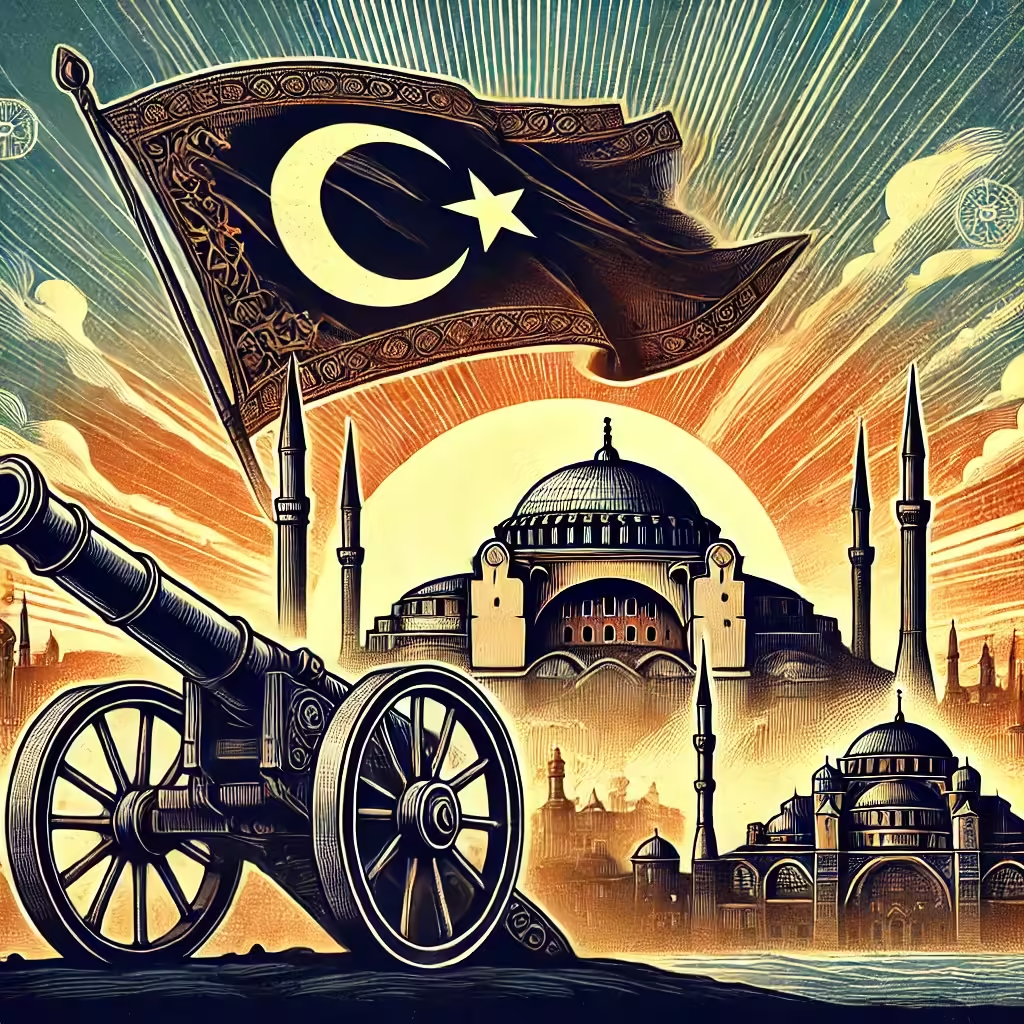The Strategic and Historical Importance of Constantinople
Constantinople, the capital of the Byzantine Empire, was one of the most significant cities in the medieval world due to its strategic location, economic wealth, and cultural influence. The conquest of the city by the Ottoman Empire on May 29, 1453, led by Sultan Mehmed II (Mehmed the Conqueror), marked a turning point in world history. But what were the main reasons behind this conquest?
This article explores the political, economic, military, and religious factors that led to the Ottoman conquest of Constantinople. If you are interested in historical events that shaped modern civilizations, keep reading and share your thoughts in the comments!
Political and Geopolitical Reasons
The Decline of the Byzantine Empire
The Byzantine Empire, once a powerful entity, had been in decline for centuries due to:
- Territorial losses: Byzantine lands had significantly shrunk due to attacks from the Ottomans, Serbians, and Bulgarians.
- Internal conflicts: Civil wars and power struggles weakened the empire from within.
- Lack of allies: Despite seeking help from Western Europe, the Byzantines failed to secure strong military support.
📌 Example: The Byzantine Emperor Constantine XI tried to gain support from the Pope and European Christian rulers, but the aid they provided was insufficient.
Ottoman Expansion Policy
The Ottomans had been expanding their territories for over a century. Constantinople was a major obstacle to their goal of uniting their lands in Anatolia and the Balkans.
- Strategic advantage: Controlling Constantinople would allow the Ottomans to establish dominance over both Europe and Asia.
- Unifying the empire: The city stood between the Ottoman territories, making it a natural target for conquest.
Economic and Trade Factors
Control of Trade Routes
Constantinople was a major trade hub connecting Europe and Asia. By capturing the city, the Ottomans would:
- Control the Silk Road and other trade routes.
- Gain access to Black Sea and Mediterranean trade networks.
- Increase tax revenues from merchants passing through the city.
📌 Fact: The Byzantines relied heavily on trade taxes to sustain their weakened economy. The fall of Constantinople gave the Ottomans total control over these lucrative trade networks.
Wealth and Resources
The city was rich in resources, with a strong economy that could boost the Ottoman treasury. By conquering Constantinople, the Ottomans:
- Acquired gold and silver reserves.
- Gained valuable craftsmen and artisans to strengthen their economy.
- Secured a strategic port city for naval dominance.
Military and Technological Factors
Ottoman Military Superiority
The Ottoman army was one of the most advanced and powerful forces in the 15th century. Key military advantages included:
- A well-trained and disciplined army.
- The use of gunpowder and large cannons, which gave them an edge in siege warfare.
- A strong navy, which helped in cutting off supplies to the Byzantine defenders.
📌 Example: The Great Turkish Bombard, a massive cannon built by Hungarian engineer Urban, played a crucial role in breaching Constantinople’s walls.
Weakness of Byzantine Defenses
Despite having strong city walls, the Byzantines suffered from:
- Lack of manpower: Only 7,000 soldiers defended the city against over 100,000 Ottoman troops.
- Old military technology: The Byzantines relied on medieval defensive tactics, which were ineffective against Ottoman artillery.
- Limited supplies: The city's resources were depleted due to prolonged sieges.
📌 Fact: The famous Theodosian Walls, which had protected the city for centuries, could not withstand the continuous cannon fire from the Ottoman forces.
Religious and Cultural Motivations
Islamic and Ottoman Ideology
The conquest of Constantinople was seen as a holy mission by the Ottomans. According to Islamic prophecy, a leader would one day conquer the city:
Prophet Muhammad is believed to have said:
"Verily, you shall conquer Constantinople. What a wonderful leader is its leader, and what a wonderful army is that army!"Mehmed II saw himself as the chosen leader for this historic event.
The Division Within Christianity
The Byzantine Empire was primarily Eastern Orthodox, while Western European kingdoms followed Roman Catholicism. This division prevented a united Christian defense against the Ottomans.
📌 Example: Pope Nicholas V tried to organize a Crusade to defend Constantinople, but internal disputes in Europe prevented effective action.
Comparison of Byzantine and Ottoman Strengths
| Factor | Byzantine Empire | Ottoman Empire |
|---|---|---|
| Military Power | Outdated tactics, small army | Advanced technology, large army |
| Economic Strength | Weak economy, high taxes | Strong economy, growing trade |
| Political Stability | Internal conflicts, lack of allies | Unified empire, expanding power |
| Technology | Relied on medieval fortifications | Gunpowder, advanced artillery |
Impact of the Conquest
The End of the Byzantine Empire
With the fall of Constantinople, the Byzantine Empire ceased to exist. The city was renamed Istanbul, becoming the new capital of the Ottoman Empire.
The Rise of the Ottoman Empire
Constantinople became the center of Ottoman administration and culture, marking the beginning of a new era. The city grew into a major global power, influencing world politics, trade, and religion.
Impact on Europe and the Renaissance
The fall of Constantinople led to Greek scholars fleeing to Europe, bringing classical knowledge with them. This helped spark the Renaissance, a period of great artistic and scientific advancement in Europe.
The Conquest of Constantinople and Its Lasting Effects
📌 The conquest of Constantinople was driven by political, economic, military, and religious factors.
📌 The Byzantine Empire was already weakened, making the city vulnerable to an Ottoman invasion.
📌 The Ottoman army’s technological superiority, especially the use of artillery, played a decisive role in the conquest.
📌 The fall of Constantinople ended the medieval period and marked the beginning of the early modern era.
What are your thoughts on the conquest of Constantinople? Do you think the outcome was inevitable? Share your opinions in the comments!



